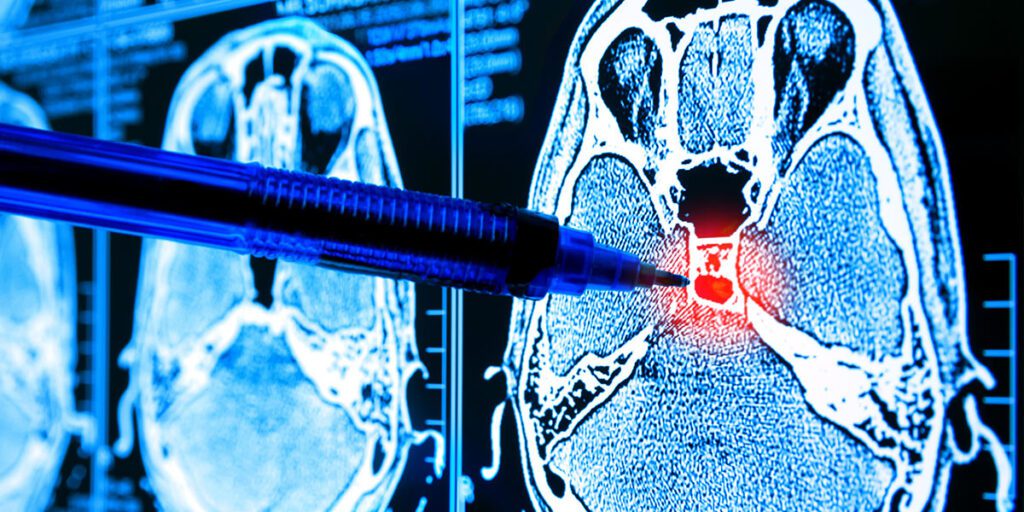If your doctor has asked you to get an MRI of the brain, your mind may logically jump to the worst possibilities: you have a brain tumor or some other potentially deadly condition. But the reality is that MRI of the brain is actually used as a diagnostic tool for many different conditions affecting the brain and spinal cord.
While many brain conditions can be serious or life-threatening, it’s important to realize that an MRI of the brain isn’t something that should be scary. It’s a beneficial process that can help your medical team spot potential problems and offer treatment before the issues develop into something more severe.
What Is an MRI of the Brain?
So, what exactly is an MRI of the brain? Let’s break it down a bit. The acronym MRI stands for magnetic resonance imaging, a type of imaging scan that uses magnets and radio waves to provide detailed images of the body.
An MRI of the brain uses noninvasive technology to develop a detailed image of your brain, including the brainstem and pituitary gland. These images provide your medical team with incredibly valuable information about your brain’s appearance and any medical conditions affecting it.
Wondering how an MRI of the brain is different from a brain CT scan? Both are standard imaging tests, but a CT scan uses radioactive X-rays to capture images while an MRI uses radio waves.
Conditions an MRI of the Brain Can Detect
Your doctor may order an MRI of the brain for many different reasons, and it is often used to quickly confirm or determine a diagnosis of a brain-related medical condition that requires emergency treatment.
While a brain MRI can reveal irregularities such as tumors, lasting impacts from injury or trauma, bleeding, swelling, cysts, and more, it is also sometimes used to provide an accurate depiction of the brain, helping to confirm a diagnosis of non-emergency medical conditions affecting the brain, such as ADHD. While the use of an MRI of the brain in the mental health field is still undergoing evaluation, there is some indication that the process can be helpful.
Some common medical conditions diagnosed using an MRI of the brain include:
Aneurysms or Hemorrhages
An MRI of the brain can be used to detect aneurysms and hemorrhages in the brain, which can be life-threatening issues. A brain aneurysm is a weak, bulging area in the wall of an artery in your brain. Brain damage, a stroke or death can occur if an aneurysm ruptures.
An MRI of the brain can also detect hemorrhages or other issues with blood flow. Improper blood flow through the brain can deprive the brain of vital oxygen and contribute to stroke or brain damage.
Brain Edema
Brain edema is a condition characterized by swelling or inflammation of the brain. This inflammation typically indicates that a factor or object is causing increased pressure in your brain. This can cause pain and discomfort, and it can also contribute to other health issues.
Cysts or Tumors
Brain cysts and tumors can be diagnosed using an MRI of the brain. Both cysts and tumors are abnormal growths, and they can be either noncancerous or cancerous.
Traumatic Brain Injury
Traumatic brain injuries, or TBI, can vary in severity. A brain MRI enables specialists to pinpoint the location of the damage and assess the extent of the injury’s impact, including any bleeding or swelling.
Hydrocephalus
Hydrocephalus occurs when there is too much fluid in your brain. While some fluid is needed to protect your spinal cord and brain, too much can be dangerous. An excessive amount of fluid puts pressure on the brain’s tissues, which can disrupt its function and be fatal.
Multiple Sclerosis
Multiple sclerosis, often referenced as simply MS, is a progressive disease affecting the brain and central nervous system. With MS, the immune system mistakenly attacks the protective sheath surrounding nerve endings.
An MRI of the brain is typically used to help confirm a diagnosis of multiple sclerosis and gauge its severity and progress.
Spinal Cord Disorders
Spinal cord injuries are often the result of some sort of traumatic injury. Because soft tissue injuries, such as those around the spinal cord, aren’t captured vividly on radiographic scans, such as CT scans, an MRI of the brain can be used to properly visualize an injury and determine the next steps for treatment.
Stroke
A stroke occurs when the blood supply to a part of your brain is cut off or impeded. This disrupts the flow of oxygenated blood to your brain, and brain tissue can begin to die within minutes when this occurs.
Brain MRI can be used to detect damaged brain tissue that results from an ischemic stroke or a brain hemorrhage and determine the immediate next steps for intervention.
Has your doctor ordered a brain MRI? Contact us to request an appointment at our nearest location.
